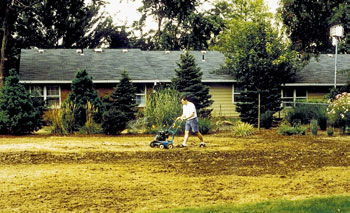Organic lawn care program

Having a beautiful lawn can add value to your property and provide a peaceful outdoor space for your family to enjoy. However, maintaining a lawn requires a lot of time, effort, and resources. Organic lawn care is a sustainable and environmentally friendly alternative to traditional lawn care methods that use synthetic chemicals. In this blog, we'll explore the benefits of organic lawn care and how to transition to an organic lawn care program.
Benefits of Organic Lawn Care -
Safer for People and Pets:
Organic lawn care methods do not use synthetic chemicals, which can be harmful to people and pets. By using natural products and methods, organic lawn care provides a safer environment for everyone who uses the lawn.
Improves Soil Health:
Organic lawn care focuses on improving soil health. Healthy soil promotes strong root growth and improves the overall health of the lawn. Organic lawn care practices such as composting, mulching, and using natural fertilizers can help to build healthy soil.
Reduces Water Usage:
Organic lawn care can reduce water usage by promoting drought-resistant grasses and using natural methods such as proper lawn maintenance, soil aeration, and organic fertilization. By reducing water usage, organic lawn care can help to conserve water resources.
Enhances Biodiversity:
Organic lawn care practices such as planting native grasses and wildflowers can help to enhance biodiversity in your lawn. This promotes a healthy ecosystem and provides a habitat for birds, insects, and other wildlife.
Cost-Effective:
Although organic lawn care may require more effort and time upfront, it can be more cost-effective in the long run. Organic lawn care practices can help to reduce the need for expensive synthetic chemicals and treatments.
Transitioning to Organic Lawn Care -
Conduct a Soil Test:
Before transitioning to organic lawn care, it's important to conduct a soil test. This will help to determine the pH levels and nutrient content of the soil, which can guide the selection of organic fertilizers and other amendments.
Choose Organic Fertilizers:
Select organic fertilizers that contain natural ingredients such as bone meal, blood meal, and compost. These fertilizers provide essential nutrients to the soil and promote healthy root growth.
Implement Proper Lawn Maintenance Practices:
Proper lawn maintenance practices such as regular mowing, watering, and soil aeration can help to promote healthy grass growth and reduce the need for synthetic chemicals.
Use Natural Pest Control Methods:
Natural pest control methods such as companion planting, using beneficial insects, and maintaining a healthy ecosystem can help to control pests without using harmful chemicals.
Plant Native Grasses and Wildflowers:
Planting native grasses and wildflowers can help to enhance biodiversity and promote a healthy ecosystem.
In conclusion, transitioning to organic lawn care can provide numerous benefits for your lawn and the environment. By choosing organic fertilizers, implementing proper lawn maintenance practices, using natural pest control methods, and planting native grasses and wildflowers, you can promote a healthy and sustainable lawn that is safe for people and pets.